1. With so Much S&P New High Talk….Good to Reflect on Diversification.

Thanks to our friends at BlackRock for this chart.
2. Emerging Markets-A Great Look at the Cycle.
From Tim Hussar at Wharton Hill Advisors.
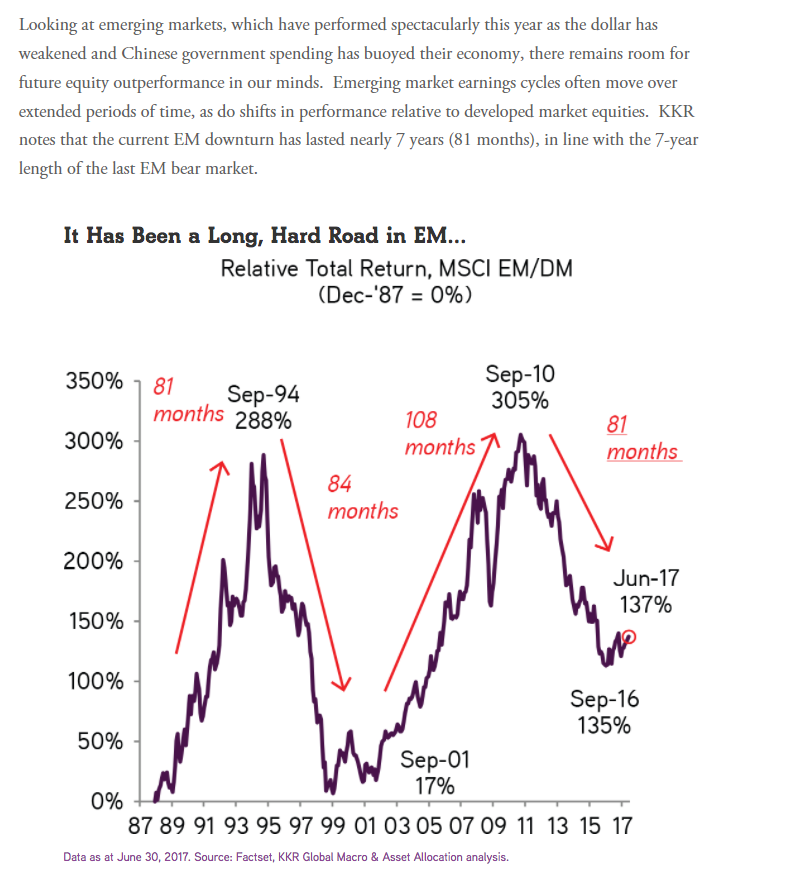
https://www.whartonhillia.com/viewpoints/2017/8/4/under-the-hood-august-2017
3. Small Business Optimism Back to 2006 Highs.
The Index of Small Business Optimism rose 1.6 points to 105.2, preserving the surge in optimism that started the day after the election. Seven of the 10 Index components posted a gain, two declined, and one was unchanged. Since the recession, the Index peaked at 105.9 in January, just 0.7 points above the July reading.
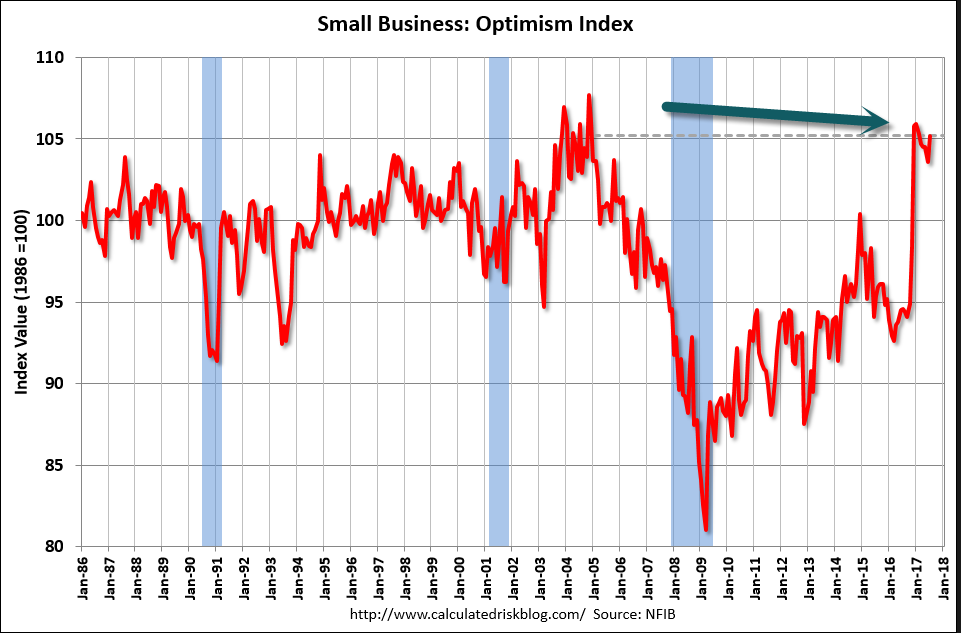
http://www.calculatedriskblog.com/2017/08/nfib-small-business-optimism-index.html
4. Private Equity Sitting on $1 Trillion in Cash.
Exchange-traded funds flush with cash as private equity struggles invest record $1 trillion
With private equity firms sitting on a record amount of cash they’re struggling to invest, their clients are turning to exchange-traded funds for relief.
By: Bloomberg | Updated: August 10, 2017 10:35 AM
The amount of dry powder — money raised but not yet invested — could hit trillion by the end of year in private equity alone. (Image: Reuters)
With private equity firms sitting on a record amount of cash they’re struggling to invest, their clients are turning to exchange-traded funds for relief. BlackRock Inc. and State Street Corp., two of the world’s biggest providers of ETFs, say an increasing number of institutional investors are using their products to park money earmarked for private funds. These investors — pension plans, foundations and endowments that are under pressure to meet obligations — are trying to eke out an extra return on cash that would otherwise languish in a money market fund.
“They can’t afford to have money sitting in cash or similar low-yielding investments,” said Armit Bhambra, who works for BlackRock’s iShares U.K. institutional team from London. “It’s difficult to justify sitting in cash for 24 months, so they’re having to think about different ways to fund these types of mandates.”
The amount of dry powder — money raised but not yet invested — could hit $1 trillion by the end of year in private equity alone, after reaching $963 billion in July, according to researcher Preqin Ltd. That’s pushing out the average time it takes for new commitments to start being invested to as long as three years, up from one year previously, according to State Street.
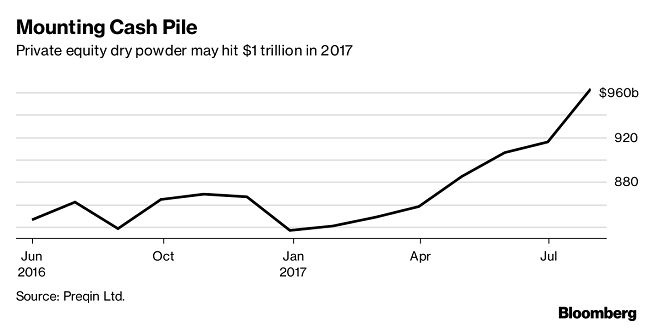
5. Netflix (NFLX) Now Boasts More U.S. Subscribers than all Cable Carriers Combined.
I have highlighted cutting the chord data over the years.
RBC Capital Markets estimates that cable’s subscriber base will decline by 3% this year, which would be about twice the rate of decline seen last year.
Digital ad spending passed advertising outlays for TV for the first time last year. This year, the gap will widen to $10 billion—with $83 billion for digital, and $73 billion for TV, according to industry forecaster eMarketer. By 2021, the gap could be more than $50 billion. And while TV is in a spending race for content, YouTube and Facebook get free content created by their users.
40 YouTube videos that have each been watched 10 times more than any Super Bowl. Advertisers are quickly shifting dollars online.
http://www.barrons.com/articles/tvs-sports-problem-1501909637?mod=BOL_twm_ls&tesla=y
NFLX 5 Years +2000% vs. Comcast 124% and Liberty 22%
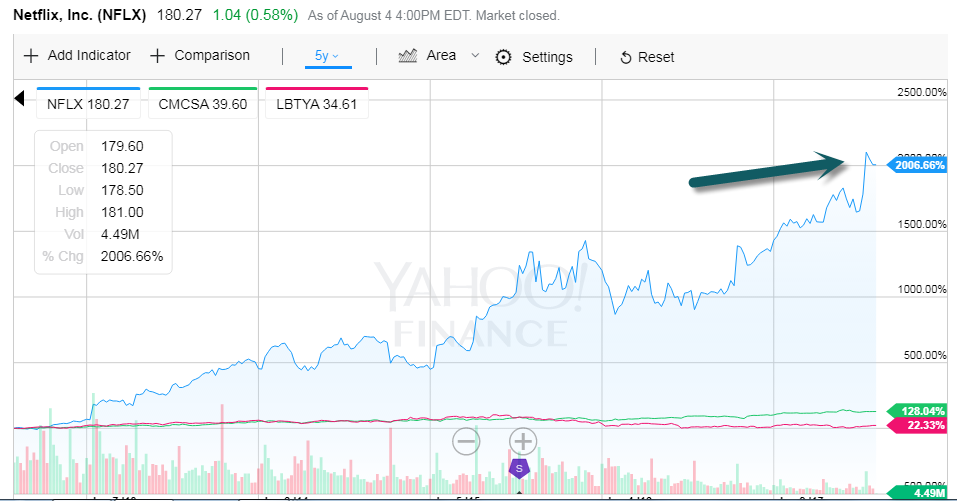
6. Airbnb is Now the Biggest Hotel Company in World.
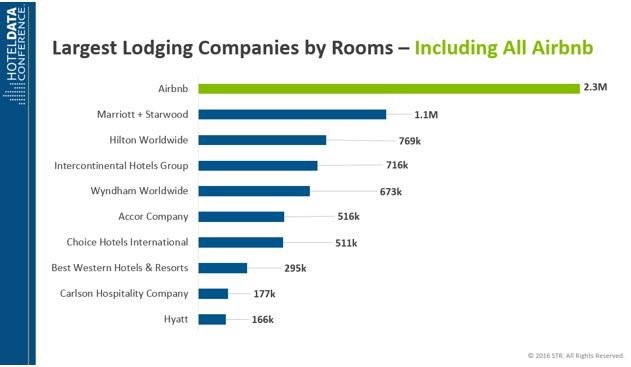
http://www.businessinsider.com/airbnb-isnt-hurting-hotels-2016-10
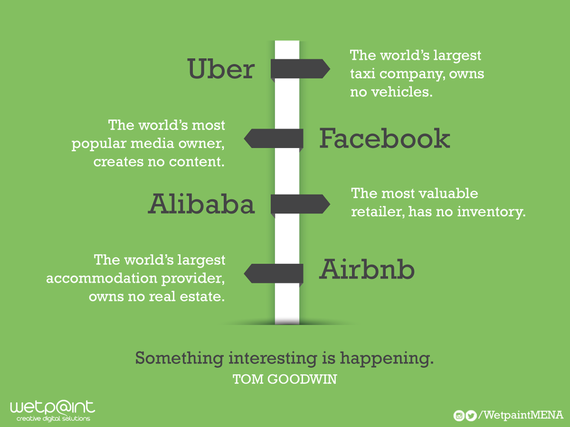
7. The Least and Most Trusted News Sources in America
Which news sources are the most trustworthy?
This seems like a simple question – but in the “fake news” era, things haven’t been so straightforward. As a result, the public’s level of trust in mass media has fallen to a low of just 32%.
EXAMINING THE TRUST SPECTRUM
A new survey by the Trusting News Project helps shed more light on the state of trust in media, revealing the attitudes of 8,728 people in the United States. Administered through 28 media outlets around the country, the survey asked respondents how trusting they are of the media, whether they financially support news organizations, and which outlets are the most (and least) trustworthy.
Here are results to the question about trustworthiness of specific news sources:
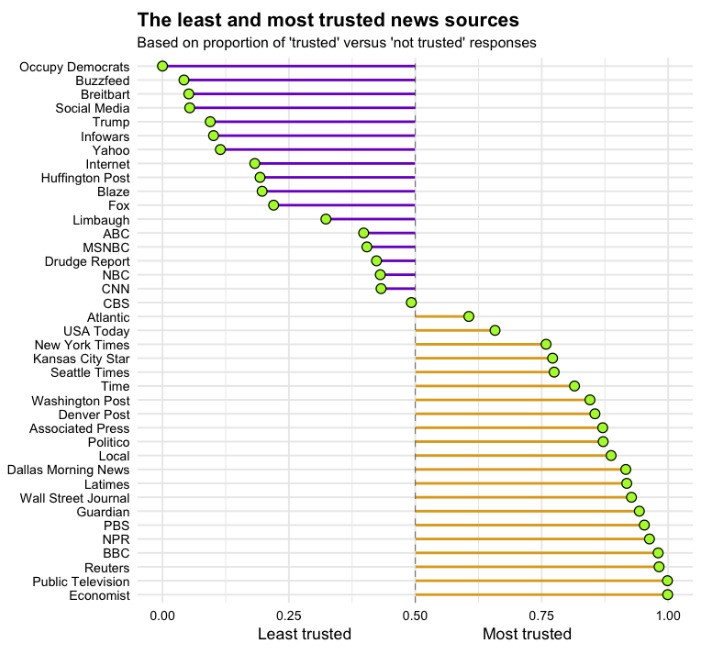
Before we dive into the results, it’s worth noting that respondents were self-selected and tend to skew to the liberal side of the political spectrum. More on this later in the post, but keep it in mind.
http://www.visualcapitalist.com/least-most-trusted-news-sources/
8. Must read article on how our lives will change dramatically in 20 years.
FollowDavid Delahunty — Designer
The following points are taken from Udo Gollub, the CEO of 17 Minute Languages
- Software will disrupt most traditional industries in the next 5-10 years.
- Uber is just a software tool, they don’t own any cars, and are now the biggest taxi company in the world
- Airbnb is now the biggest hotel company in the world, although they don’t own any properties.
- Artificial Intelligence: Computers become exponentially better in understanding the world. This year, a computer beat the best Go player in the world, 10 years earlier than expected.
- In the US, young lawyers already don’t get jobs. Because of IBM Watson, you can get legal advice (so far for more or less basic stuff) within seconds, with 90% accuracy compared with 70% accuracy when done by humans.
- So if you study law, stop immediately. There will be 90% less lawyers in the future, only specialists will remain.
- Watson already helps nurses diagnosing cancer, 4 times more accurate than human nurses. Facebook now has a pattern recognition software that can recognize faces better than humans. In 2030, computers will become more intelligent than humans.
- Autonomous cars: In 2018 the first self driving cars will appear for the public. Around 2020, the complete industry will start to be disrupted. You don’t want to own a car anymore. You will call a car with your phone, it will show up at your location and drive you to your destination. You will not need to park it, you only pay for the driven distance and can be productive while driving. Our kids will never get a driver’s licence and will never own a car.
- It will change the cities, because we will need 90-95% less cars for that. We can transform former parking spaces into parks. 1.2 million people die each year in car accidents worldwide. We now have one accident every 60,000 miles (100,000 km), with autonomous driving that will drop to one accident in 6 million miles (10 million km). That will save a million lives each year.
- Most car companies will probably become bankrupt. Traditional car companies try the evolutionary approach and just build a better car, while tech companies (Tesla, Apple, Google) will do the revolutionary approach and build a computer on wheels.
- Many engineers from Volkswagen and Audi; are completely terrified of Tesla.
- Insurance companies will have massive trouble because without accidents, the insurance will become 100x cheaper. Their car insurance business model will disappear.
- Real estate will change. Because if you can work while you commute, people will move further away to live in a more beautiful neighborhood.
- Electric cars will become mainstream about 2020. Cities will be less noisy because all new cars will run on electricity. Electricity will become incredibly cheap and clean: Solar production has been on an exponential curve for 30 years, but you can now see the burgeoning impact.
- Last year, more solar energy was installed worldwide than fossil. Energy companies are desperately trying to limit access to the grid to prevent competition from home solar installations, but that can’t last. Technology will take care of that strategy.
- With cheap electricity comes cheap and abundant water. Desalination of salt water now only needs 2kWh per cubic meter (@ 0.25 cents). We don’t have scarce water in most places, we only have scarce drinking water. Imagine what will be possible if anyone can have as much clean water as he wants, for nearly no cost.
- Health: The Tricorder X price will be announced this year. There are companies who will build a medical device (called the “Tricorder” from Star Trek) that works with your phone, which takes your retina scan, your blood sample and you breath into it.
- It then analyses 54 biomarkers that will identify nearly any disease. It will be cheap, so in a few years everyone on this planet will have access to world class medical analysis, nearly for free. Goodbye, medical establishment.
- 3D printing: The price of the cheapest 3D printer came down from $18,000 to $400 within 10 years. In the same time, it became 100 times faster. All major shoe companies have already started 3D printing shoes.
- Some spare airplane parts are already 3D printed in remote airports. The space station now has a printer that eliminates the need for the large amount of spare parts they used to have in the past.
- At the end of this year, new smart phones will have 3D scanning possibilities. You can then 3D scan your feet and print your perfect shoe at home.
- In China, they already 3D printed and built a complete 6-storey office building. By 2027, 10% of everything that’s being produced will be 3D printed.
- Business opportunities: If you think of a niche you want to go in, ask yourself: “in the future, do you think we will have that?” and if the answer is yes, how can you make that happen sooner?
- If it doesn’t work with your phone, forget the idea. And any idea designed for success in the 20th century is doomed to failure in the 21st century.
- Work: 70-80% of jobs will disappear in the next 20 years. There will be a lot of new jobs, but it is not clear if there will be enough new jobs in such a small time.
- Agriculture: There will be a $100 agricultural robot in the future. Farmers in 3rd world countries can then become managers of their field instead of working all day on their fields.
- Aeroponics will need much less water. The first Petri dish produced veal, is now available and will be cheaper than cow produced veal in 2018. Right now, 30% of all agricultural surfaces is used for cows. Imagine if we don’t need that space anymore. There are several startups who will bring insect protein to the market shortly. It contains more protein than meat. It will be labelled as “alternative protein source” (because most people still reject the idea of eating insects).
- There is an app called “moodies” which can already tell in which mood you’re in. By 2020 there will be apps that can tell by your facial expressions, if you are lying. Imagine a political debate where it’s being displayed when they’re telling the truth and when they’re not.
- Bitcoin may even become the default reserve currency … Of the world!
- Longevity: Right now, the average life span increases by 3 months per year. Four years ago, the life span used to be 79 years, now it’s 80 years. The increase itself is increasing and by 2036, there will be more than one year increase per year. So we all might live for a long long time, probably way more than 100.
- Education: The cheapest smart phones are already at $10 in Africa and Asia. By 2020, 70% of all humans will own a smart phone. That means, everyone has the same access to world class education.
- Every child can use Khan academy for everything a child needs to learn at school in First World countries. There have already been releases of software in Indonesia and soon there will be releases in Arabic, Suaheli and Chinese this summer. I can see enormous potential if we give the English app for free, so that children in Africa and everywhere else can become fluent in English and that could happen within half a year.
Brought to you by http://www.growyourclicks.com/p/introduction
If you like this article you might enjoy my 5 ideas every day for a year article
Follow me on twitter www.twitter.com/delahuntagram
9. Opioid Epidemic.
Food for Thought: Daily opioid dose.
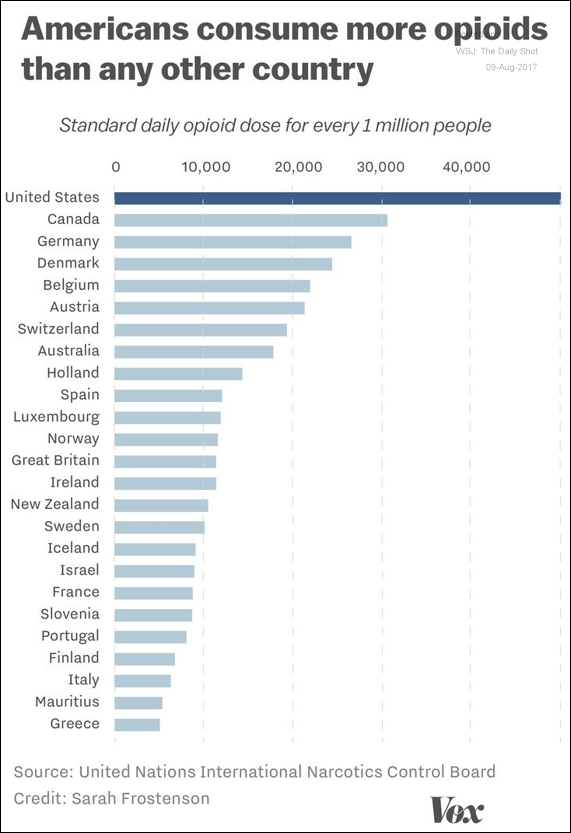
Source: @voxdotcom; Read full article
Physicians from better-ranked medical schools prescribe fewer opioids.
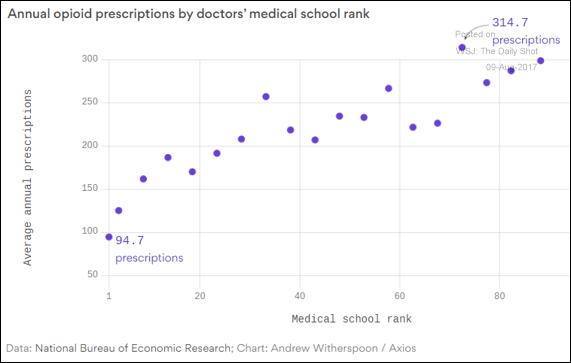
Source: @axios; Read full article
10.Why Even Ambitious People Rarely Become Successful
Success is not extrinsic… It’s not measurable.
“Success” can only truly occur internally, because it is based on emotion. At the most basic level, success is your relationship with yourself. Most people are living a lie. They purposefully ignore and distract themselves from what they deep down want for themselves.
Many people want something more for themselves. They have dreams and ambitions. Yet, few of these people ever get what they intended.
Being ambitious isn’t enough. Far more important than ambition is commitment.
When you’re committed to something, you will be and do what is required for the attainment of that thing. You’ll stop wondering and start building. You’ll stop being distracted and start learning. You’ll start connecting. You’ll start failing. You’ll get what you want, rather than have a long list of “ambitions.” You’ll have actual accomplishments that reflect your inner goals and values. Your external environment will reflect your deepest internal views and aims.
If you’re committed to a marriage, you’ll change in whatever ways are necessary for your marriage to thrive. You’ll become what is required to make it work. If you’re committed to your craft, you’ll change and become what is required to do work at the level of your desire. You won’t point to your limitations with a victim mentality. You’ll change your limitations so they stop stopping you.
Only those who are truly committed will become a new and different person in order to live their commitment.
If you’re not willing to change, then you aren’t committed to anything beyond what you currently have. If you don’t believe you can change, then you can’t commit to anything beyond what life randomly throws at you.
The Myth Of The “Unchanging” Self
“Become a millionaire not for the million dollars, but for what it will make of you to achieve it.” — Jim Rohn
Your life is a reflection of you. If you want to change your life, you have to change yourself. If you want to change the world, you have to be that change.
If you want to become a millionaire, you need to become the kind of person that can do that. If you want healthy relationships, you need to become the kind of person that has healthy relationships.
Interestingly, in our Western Culture, we falsely emphasize fixed traits and “personality” types. We believe very strongly in an unalterable “nature” which is uninfluenced and untouched by the environments in which we reside.
We believe something about us is self-contained, and exists outside of space and time. This is individualism at it’s finest, and it leads us to believe in some theoretical and “true” version of ourselves, which cannot and does not change.
The truth is that you are always changing. Your brain and even biology are highly malleable. Your worldview is continually integrating new information. When you change a part of any system, you change the whole. Thus, overtime, as you have new experiences, surround yourself with new people, and learn new things, you emerge as a new person. Yet, these changes occur gradually and in real-time, and thus are almost impossible for you to notice.
Yet, as you learn new things overtime, your brain literally creates new connections and is reshaped. The brain you will have in a year from now will literally be a different brain than the one you have now. Especially if you consciously reshape how you see and live in the world.
Consequently, when you become fully committed to something, you throw the individualistic myths away. You are part of a dynamic system that is constantly changing.
When you’re committed, you stop justifying mediocrity in the name of authenticity.
You stop lying to yourself about what you want and what you believe in.
You create an environment that facilitates your commitment, because you know that as a person, you take on the form of your environment. The only agency you truly have is to choose the influences that shape you, both internally and externally.
If you’re not committed, you rely on willpower. You remain indecisive. You leave things up to chance.
You leave yourself outs. You never fully decide.
When you’re not committed, you live in a continual state of self-hatred and internal-conflict. Over and over and over, you watch yourself consciously behave in ways that oppose your highest ambitions.
Only Those Who Are Committed Succeed
Being ambitious isn’t honorable. Wanting more for your life is a common desire.
But being completely committed to something is not common. It’s rare. It’s rare because commitment requires, in the words of T.S. Eliot, “nothing short of everything.”
The hardest thing you will give up is the false idea of what you think you are. You have no clue what you are. More importantly, there is no “you” that is fixed and permanent, only the individualistic idea you have of yourself.
This “authentic” self is your worst enemy. It’s the excuse you have for not evolving. It’s your justification for not committing to something bigger and better. It’s the chain around your neck, stopping you from putting yourself into situations that will demand you become a better version of you.
As researcher and professor, Adam Grant, has said, “But if authenticity is the value you prize most in life, there’s a danger that you’ll stunt your own development… Be true to yourself, but not so much that your true self never evolves.”
This article was originally published on Medium
About the Author: Benjamin Hardy was the #1 writer on Medium.com in 2016. He is a husband and father that writes about self-improvement, motivation, and entrepreneurship. His writing is fueled by his personal experiences, self-directed education, and formal education.
https://www.earlytorise.com/ambitious-people-rarely-become-successful/